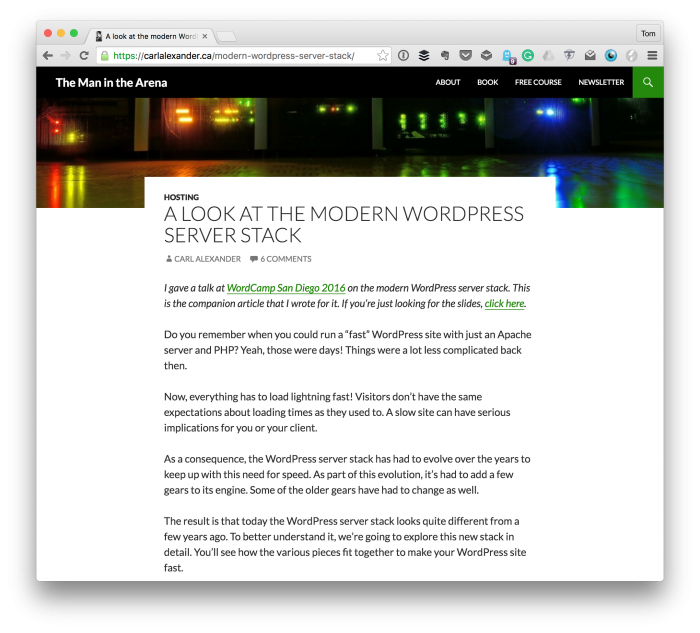During WordCamp San Diego, I had the pleasure of meeting and hearing Carl Alexander speak on the topic of the modern WordPress Server Stack.

A few notes:
- If you’re not following Carl on Twitter, I recommend it. He’s an incredibly smart person who is doing some really neat things with WordPress.
- If you’re not subscribed to his blog but are interested in advanced programming topics as it relates to WordPress, I recommend subscribing.
- If you weren’t present for his talk, you can catch it on WordPress.tv.
With that said, Carl also included an article that accompanied his presentation on his blog and it’s something that I think makes for good reading.
I find this especially true if you’re someone who is at an intermediate level of WordPress development or if you’re someone who’s looking to learn more about server administration.
A Modern WordPress Server Stack
The gist of the presentation is based on the following idea (and how we can improve it):
Do you remember when you could run a “fast” WordPress site with just an Apache server and PHP? Yeah, those were days! Things were a lot less complicated back then.
Throughout the talk, Carl hits on the following topics:
- Understanding and optimizing the request-response cycle,
- Various web servers that are available (and which one is preferred for high-performance sites),
- Understanding FastCGI and HTTP/2
- A solid breakdown for how caching works outside of WordPress (at the level of HTTP),
- How WordPress comes into play and understanding the query-result lifecycle,
- And much more.
If you’re interested in gaining a much deeper understanding of the entire lifecycle as it relates from when someone makes a request to a WordPress website and how you can optimize the whole experience from end-to-end.

The lifecycle of request and response in WordPress. Credit to Carl Alexander for the graphic.
For those who are interested, Carl’s also provided access to the slides.
While I’m mentioning it, I also recommend checking out Carl’s course on an introduction to his object-oriented. It’s a fantastic resource for anyone who’s looking to get started with the object-oriented paradigm but isn’t sure where to start.
Finally, since this isn’t my article but merely a reference to a resource that I think many WordPress developers should follow, I’ve closed comments. If you have comments, questions, or things to add then make sure to leave a comment on his blog.

